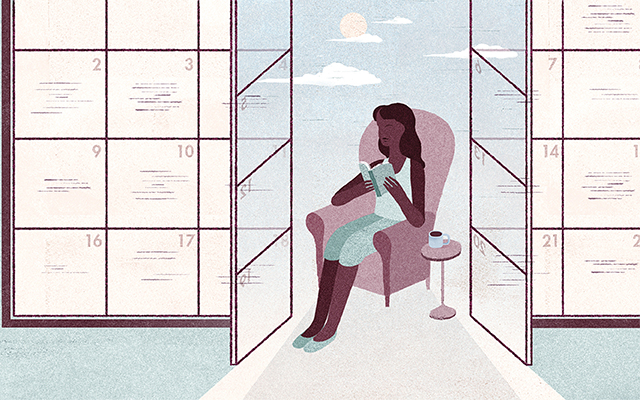|
Listen to this article:
|
Devon Price, PhD, had always been a hard worker. A clinical assistant professor in psychology at Loyola University Chicago, he had prided himself on this trait. To his mind, overwork and overcommitting to loved ones — and even sometimes near-strangers — was better than the alternative. Buying into a culture that often ties productivity to self-worth, Price viewed laziness or idleness as basically the kiss of death.
Then, in 2014, while finishing his dissertation, Price became debilitatingly sick. For almost a year. And he realized everyone around him was also burned out, unwell, and overcommitted. It was this realization that led him to write Laziness Does Not Exist.
“The feelings we write off as ‘laziness’ are some of humanity’s most important instincts, a core part of how we stay alive and thrive in the long term,” Price writes. He calls the book a “full-throated defense” of those who have been maligned by this label or disillusioned by this myth — which, he notes, is pretty much all of us.
And he has a lot to say about the origin of what he calls the “Laziness Lie” — and how we can begin to resist it.
The Laziness Lie
Price coined the phrase to highlight the pernicious set of internalized messages that keep us working harder and producing more. There are three main tenets:
- Your worth is your productivity;
- you cannot trust your own feelings and limits;
- and there is always more you could be doing.
When we buy into this myth, he explains, a dangerous disconnect occurs between mind and body. Because we can’t trust our own feelings, we can’t advocate for ourselves. And because we could always be doing more — and we’re worthless if we don’t — there’s virtually no limit to what the lie can persuade us to strive to do.
“The other day on Instagram, I saw a mental-health infographic telling people that taking a break to use the bathroom while at work is a form of self-care. That’s how divorced capitalism and overwork has us from our bodies,” he notes.
“Most of us spend our entire working lives ignoring our hunger, ignoring our tiredness, working through sickness, even ignoring our bowels and bladders, because being a full living being with needs and emotions is viewed as a threat to our productivity, and productivity supposedly determines our worth.”
This connection between worth and productivity is tied to Puritanical culture and the history of slavery in the United States, he writes. Identifying those roots is key to understanding how damaging the Laziness Lie has been — and who stands to suffer or benefit most from its persistence.
“The Protestant work ethic that the Puritans brought to the colonies was politically useful when enslaving whites wished to justify enslavement to themselves and to other people,” Price explains. At that time, forced daily work was considered a Christian moral obligation.
Today, the Laziness Lie affects most everyone, but some of us remain more vulnerable than others. The more marginalized a person is, he says, the more likely they are to be evaluated in terms of the profit they offer someone else — and to be deemed lazy or useless if that profit isn’t considered sufficient.
“Many in our culture still treat disabled people as complainers who are faking their illness and are presumed to have not tried ‘hard enough’ to deserve benefits.”
As an Autistic person, Price has experienced this dynamic personally. “People like me are only accepted professionally because there is this myth that Autistic people are savant-like geniuses who therefore deserve to be tolerated, because we can be ‘useful’ to the abled people around us,” he says.
“This is basically what every marginalized group experiences, in one form or another, under the Laziness Lie: Only the most productive, conforming, convenient forms of difference are conditionally tolerated, so long as they keep producing.”
How to Advocate for Less
Even when people embrace the concept of doing less, they often do so with an optimization mindset, because the ideal of better, faster, stronger has been so ingrained in all of us. But these issues aren’t personal, Price emphasizes; they’re systemic.
“We aren’t workaholics with random neuroses that came out of nowhere,” he says. “We are exploited laborers stuck within capitalism.”
And because the problem is communal, he adds, we can’t fully solve it for ourselves. Still, there are small steps you can take to resist the Laziness Lie in your own life.
Price suggests that we start with “doing less, saying no, and letting ourselves be just ‘good enough’ at our jobs, and as parents, volunteers, creatives, or whatever else we are. When we work together to refuse unrealistic expectations, we all do better.”
The Way Forward
There’s strong scientific evidence that doing less is actually good for our health. “When we’re able to rest, we can learn new things about ourselves or have fantastic insights that never would have occurred to us when we were focused on work,” Price writes, adding that psychologists have called this phenomenon the “incubation period.”
“The creative parts of our minds require safety, rest, and relaxation in order to produce unique ideas or insights.”
It’s why great ideas often come to us as we’re falling asleep, taking a shower, or walking leisurely. Our unconscious minds are doing powerful work — but they work best when we nurture the conditions that allow for unstructured time. (For more on the surprising benefits of taking a break, see “The Upside of Downtime“.)
Changing your personal habits is a good place to start, but given the scope of the problem, it’s not the final solution. “We can’t self-care our way out of labor exploitation,” Price says. “We need unions, universal basic income and healthcare, and an end to the many ways in which our legal system criminalizes poverty.”
He’s seeing shifts in how people think about productivity and self-worth, especially during the “great resignation” spurred by the COVID-19 pandemic. Attitudes have not necessarily changed among policymakers or business leaders, he acknowledges, but many workers are realizing that employers consider their lives to be disposable.
That understanding has already spurred changes in the labor market, such as workers at Amazon, Starbucks, and other workplaces beginning to unionize.
“COVID has cost us a lot. It’s been a multiyear, international mass-death event that nearly all of us were forced to continue working through, even when doing so came at a great risk to our lives,” Price says. “The only positive I see is that a growing number of people are realizing just how wrong that is — and their actions, reflected in our labor and economic data, are causing these old, oppressive systems to begin to break down.”
Because overwork is so prized in American culture, even if you oppose it, there’s no way to avoid it completely. “The goal here is not to ‘cure’ the Laziness Lie in ourselves or to be perfectly serene and above it all,” he explains. “Rather, the goal is to develop the tools and the resilience to not let these messages destroy us. All we can do is choose to do less, and to lighten the loads of others, and to keep doing that every day.”
Balance
Explore more empowering strategies to support your efforts to live in (closer) alignment with your values at our Balance department.
This article originally appeared as “The Myth of Laziness” in the January/February 2023 issue of Experience Life.






This Post Has 0 Comments